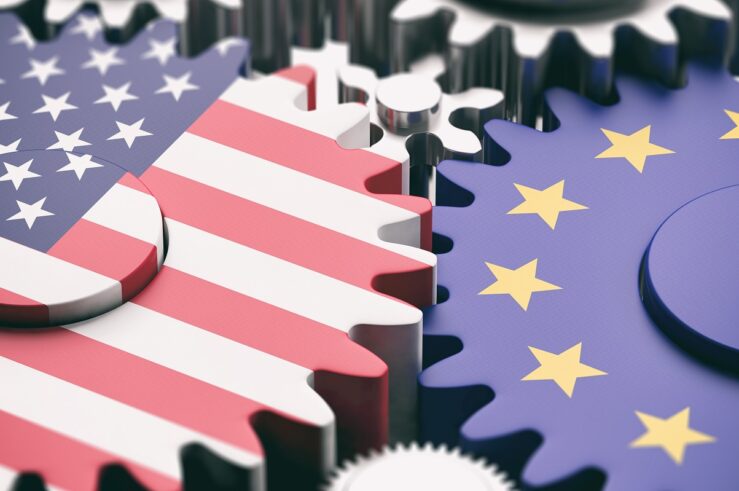Showing archive for: “International Trade”
The View from Canada: A TOTM Q&A with Aaron Wudrick
Aaron, could you please tell us a bit about your background and how you became interested in competition law and digital-competition regulation? I’m a lawyer by profession, but have taken a somewhat unconventional career path—I started as a litigator in a small general practice in my hometown outside Toronto, moved on to corporate law with ... The View from Canada: A TOTM Q&A with Aaron Wudrick
Steeling to Block a Merger
In an April 17 address to United Steelworkers in Pittsburgh, President Joe Biden vowed that his administration would “thwart the acquisition of U.S. Steel by a Japanese company,” Nippon Steel, telling the assembled union members that U.S. Steel “has been an iconic American company for more than a century and it should remain totally American.” ... Steeling to Block a Merger
EU’s Cybersecurity Draft Shifts Toward Hard Protectionism
A year ago, we cautioned that the EU Cybersecurity Certification Scheme for Cloud Services (EUCS) threatened to embed ill-conceived economic protectionism into the EU’s cybersecurity rules. And, indeed, the European Commission, which has made clear its commitment to pursue “digital sovereignty” for the European Union, can claim some preliminary successes on that front. A recent ... EU’s Cybersecurity Draft Shifts Toward Hard Protectionism
The Biden Executive Order on AI: A Recipe for Anticompetitive Overregulation
The Biden administration’s Oct. 30 “Executive Order on the Safe, Secure, and Trustworthy Development and Use of Artificial Intelligence” proposes to “govern… the development and use of AI safely and responsibly” by “advancing a coordinated, Federal Government-wide approach to doing so.” (Emphasis added.) This “all-of-government approach,” which echoes the all-of-government approach of the 2021 “Executive ... The Biden Executive Order on AI: A Recipe for Anticompetitive Overregulation
The Effect of VAT Withholding Requirements in Latin America
Innovations in payment systems are rapidly transforming the world economy. While Bitcoin, Ethereum, and other decentralized blockchain-based systems tend to garner much of the press (good and bad), centralized peer-to-peer (P2P) payment systems are far more common. (Note that I use the term P2P here in its original sense to mean all peer-to-peer transactions, which ... The Effect of VAT Withholding Requirements in Latin America
Will the EU-U.S. Data Privacy Bridge Hold?
With the European Commission’s recent announcement that it had deemed the revamped data-protection framework from the United States to be “adequate” under the European Union’s stringent General Data Protection Regulation (GDPR), the stage is set for what promises to be a legal rollercoaster in the European Court of Justice (CJEU). The Commission’s decision is certain ... Will the EU-U.S. Data Privacy Bridge Hold?
If Necessity Is the Mother of Invention, New EU SEP Rules Are Decidedly Unnecessary
An unofficial version of the EU’s anticipated regulatory proposal on standard essential patents (SEPs), along with a related impact assessment, was leaked earlier this month, generating reactions that range from disquiet to disbelief (but mostly disbelief). Our friend Igor Nikolic wrote about it here on Truth on the Market, and we share his his concern that: As it currently stands, it appears the regulation will ... If Necessity Is the Mother of Invention, New EU SEP Rules Are Decidedly Unnecessary
Digital-Market Regulation: One Size Does Not Fit All
Regulators around the globe are scrambling for a silver bullet to “tame” tech companies. Whether it’s the United States, the United Kingdom, Australia, South Africa, or Canada, the animating rationale behind such efforts is that firms like Google, Apple, Meta, and Amazon (GAMA) engage in undesirable market conduct that falls beyond the narrow purview of antitrust law (here and here). To tackle these supposed ... Digital-Market Regulation: One Size Does Not Fit All
Why Competition Enforcers’ Annual Roundtable Should Focus on Competition Advocacy and Combating Anticompetitive Market Distortions
Spring is here, and hope springs eternal in the human breast that competition enforcers will focus on welfare-enhancing initiatives, rather than on welfare-reducing interventionism that fails the consumer welfare standard. Fortuitously, on March 27, the Federal Trade Commission (FTC) and U.S. Justice Department (DOJ) are hosting an international antitrust-enforcement summit, featuring senior state and foreign ... Why Competition Enforcers’ Annual Roundtable Should Focus on Competition Advocacy and Combating Anticompetitive Market Distortions
Brussels Effect or Brussels Defect: Digital Regulation in Emerging Markets
The blistering pace at which the European Union put forward and adopted the Digital Markets Act (DMA) has attracted the attention of legislators across the globe. In its wake, countries such as South Africa, India, Brazil, and Turkey have all contemplated digital-market regulations inspired by the DMA (and other models of regulation, such as the ... Brussels Effect or Brussels Defect: Digital Regulation in Emerging Markets
Is Market Concentration Actually Rising?
Everyone is worried about growing concentration in U.S. markets. President Joe Biden’s July 2021 executive order on competition begins with the assertion that “excessive market concentration threatens basic economic liberties, democratic accountability, and the welfare of workers, farmers, small businesses, startups, and consumers.” No word on the threat of concentration to baby puppies, but the ... Is Market Concentration Actually Rising?
How Not to Use Industrial Policy to Promote Europe’s Digital Sovereignty
The concept of European “digital sovereignty” has been promoted in recent years both by high officials of the European Union and by EU national governments. Indeed, France made strengthening sovereignty one of the goals of its recent presidency in the EU Council. The approach taken thus far both by the EU and by national authorities ... How Not to Use Industrial Policy to Promote Europe’s Digital Sovereignty














